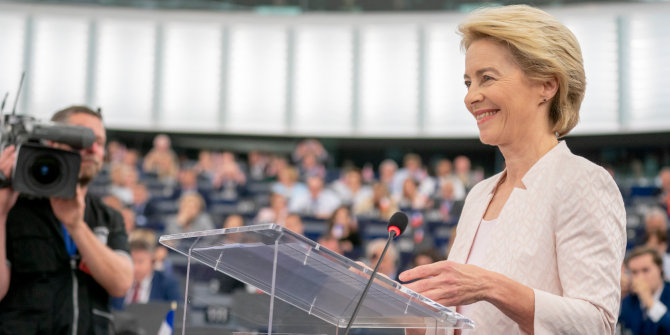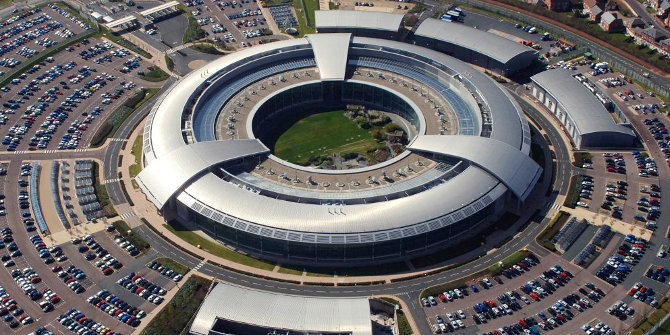 Ursula von der Leyen will take over as the new President of the European Commission on 1 November. Dennis J. Snower examines her proposals for the European Union and what the likely effect will be for the integration process, noting that a key theme in her vision for the EU is the need to invest in the hearts and minds of Europeans.
Ursula von der Leyen will take over as the new President of the European Commission on 1 November. Dennis J. Snower examines her proposals for the European Union and what the likely effect will be for the integration process, noting that a key theme in her vision for the EU is the need to invest in the hearts and minds of Europeans.
In her recent address to the European Parliament, new Commission President Ursula von der Leyen articulated a way forward toward a united Europe, stating that “if we are to go down the European path, we must first rediscover our unity; if we are united on the inside, nobody will divide us from the outside”. While sceptics heard a speech strategically crafted to win votes, it could portend a vision that stands to breathe new life into the European Union.
Many political commentators saw the speech as an appeal to Social Democrats and Greens, as well as an attempt to reinforce her Conservative backing. But her words may be interpreted very differently, with far-reaching implications for the future of Europe. If she in fact intends to put her weight behind the course she outlined, she would be meeting the aspirations of many European citizens, particularly the European youth – all those people who wish to see the EU as a force for peaceful, harmonious societies, not as a battle-ground for special interest groups.
Her concrete proposals are certainly ambitious. On climate action, they include the first ever European Climate Law, turning part of the European Investment Bank into a Climate Bank, a Carbon Border Tax and a Just Transition Fund. For the unemployed, she advocates a European Unemployment Benefit Reinsurance Scheme. For the youth, a Youth Guarantee, involving a tripling of the Erasmus+ budget, and Child Guarantee to provide access to basic services and combat poverty. For immigrants, she proposes a New Pact on Migration and Asylum. On fiscal policy, she seeks to refocus the European Semester on achieving the United Nations’ Sustainable Development Goals. All businesses, including global digital giants, are to be taxed fairly to cover the cost of education, infrastructure and social security.

Ursula von der Leyen during her presentation to the European Parliament on 16 July 2019, Credit: CC BY 4.0: © European Union 2019 – Source: EP
If these proposals are taken seriously, they represent a quantum leap beyond a European Union that is a single market, a monetary union and a supra-national governance system. It aims at a model in which the pursuit of common values and aspirations affects all facets of EU governance, from fiscal and structural policies to climate and foreign policy.
The big question is how such a vision could possibly be implemented, particularly at a time when voters in many European countries are showing increasing support for nationalist, populist and anti-immigration political movements. Throughout the EU, Europeans complain about the “democratic deficit” in Brussels. Without public approval, von der Leyen’s vision would be no more than hot air.
The way forward, according to the new Commission President, is to reconnect with European citizens, not just economically and politically, but socially. Von der Leyen notes that the forces of globalisation, digitalisation, climate change and demographic change have left many Europeans “with a feeling of losing control; of looser ties within our communities.” In short, she recognises that people feel disempowered and estranged from their social settings.
For decades, the EU has focused heavily on its “economic project” (the single market) and its “political project” (common European political institutions) but has given relatively little attention to its “social project.” This social project involves building a common identity among European citizens, so that they may become willing to work together in their common causes. Due to this imbalance, economic prosperity (through the single market) and political effectiveness (through the EU’s political institutions) have become decoupled from social prosperity (thriving people in thriving communities). The way forward, von der Leyen’s vision seems to be telling us, is to “recouple” economic prosperity and political progress with this social prosperity.
This requires a change in the mindset of European politicians, focusing not only on economic prosperity, but also on personal empowerment and social solidarity. It is for this reason that von der Leyen wants “European citizens to play a leading and active part in building the future of our Union… to have their say at a Conference on the Future of Europe, to start in 2020 and run for two years.” But most importantly, the new vision involves a change in the mindset of European citizens towards the acceptance of a shared set of norms, values and rules, generating a common identity and a common sense of destiny.
The possible implications for future EU policies are fundamental and far-reaching. One could, for example, extend the success of the Erasmus programme to all European youth through the creation of trans-European opportunities for recent graduates. Individuals could be given the opportunity to work for a year in a different country, culture and ethnic community on projects that are of mutual interest. An understanding for different perspectives, one that is based on mutual trust and gives genuine meaning to individuals, commonly arises in a shared workplace. Such an initiative could be launched with seed money from the European Commission and then financed by businesses, who have a vested interest in mobilising diverse workforces.
Another impetus for social integration in Europe would be working towards a scheme where a worker’s skills and qualifications are recognised in other EU countries. If such a system is supported by language teaching and other cultural support, transnational employment would promote social integration and create mutual rights and obligations that would contribute to the legitimacy of a European economic and social policy.
Solutions, not scepticism, are the way forward. The time has come for Europe’s most important investment, beyond infrastructure and skills: investment in the hearts and minds of Europeans to build a common home. The new Commission President articulated a moral vision and seeks to bring Europe’s governance structures into harmony with this vision. If this vision for Europe is realised and takes into consideration the political implications, a new chapter in European cooperation could be in the offing. Watch this space.
Please read our comments policy before commenting.
Note: This article gives the views of the author, not the position of EUROPP – European Politics and Policy or the London School of Economics.
_________________________________
 Dennis J. Snower
Dennis J. Snower
Dennis J. Snower is founder and President of the Global Solutions Initiative, Professor of Economics at the Hertie School of Governance, Senior Research Fellow at the Blavatnik School of Government, Nonresident Fellow of Brookings Institution and Visiting Professor at University College London and Birkbeck College. He was President of the Kiel Institute for the World Economy and is Research Fellow at the Center for Economic Policy Research (London), at IZA (Institute for the Future of Work, Bonn), and CESifo (Munich).



